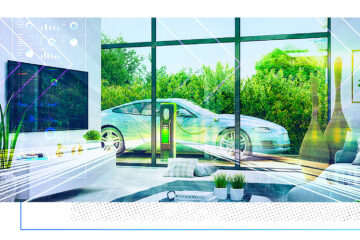In most parts of the United States and the world, electric vehicle adoption has not yet reached levels where EV charging is detrimental to grid operations. But it’s approaching fast.
According to the International Energy Agency, EV sales jumped from ~1 million to more than 10 million over the course of the last 5 years, including an increase of 55 percent from 2021 to 2022.
The increasing pace of transportation electrification is making managed charging an essential strategy to maintain grid resiliency. Unless we coordinate who is charging on a substation or a transformer at what time, we risk a breakdown in reliability as well as over-investment in grid infrastructure and the financial burden that would place on all customers.
“We already have 70,000 electric vehicles on the road in Washington State. And our governor has put a stake in the ground and said that there’s going to be a lot more. In fact, every new vehicle sold will need to be electric, hydrogen-fueled or hybrid with at least 50 miles of electric-only range by 2035,” says Heather Mulligan, Manager of Customer Clean Energy Solutions at Puget Sound Energy. “So we need to start thinking now about that impact on the grid and how we manage for that.”
Adam Grant , Director of Electrification & Energy Services at NV Energy emphasizes that “It’s not that EVs are coming, they’re here. And the expansion is going to happen very quickly. Because it is going to be so prevalent and affect our capacity, we want to put forth a managed charging program eventually that allows us to have a little control over when the customer charges, in part to help avoid or defer upgrades to the system to meet the demand that we know is coming. And we’ll be able to build and make sure that we are and we will be ready for it when it all comes at full speed.”
Targeted Managed Charging Program Engagement
It’s important to note that not every EV driver needs to be enrolled in an active managed charging program. Instead, the most cost effective and successful programs identify those customers who will have the biggest load shift impact, either based on their usage or their location. Bidgely helps utilities accurately identify and engage these ideal target customers by applying advanced data science and AI to AMI data to reveal residential charging patterns.
For other EV drivers, demand response or “passive” managed charging programs that encourage behavior modification without direct controls can provide a secondary means to manage EV load. Bidgely’s behavioral expertise provides an invaluable tool.
In this scenario, AI-powered insights derived from AMI data enable utilities to send customers behavioral nudges through email and SMS whether or not they have enrolled in an EV program or allowed the utility to connect to their vehicle equipment. Passive managed charging can be particularly useful in support of a Time of Use program to ensure customers benefit from the rate structure.
“We know these EVs are coming, and they are going to be a demand on our system. Our biggest challenge is integrating that load on both a volume basis and on a timing basis,” says Charles Spence, Manager of Vehicle-Grid Integration Programs at Avangrid. “We have end-of–day peaks already. When people come home, they turn on their AC, the TV — all of these appliances. And now, when they plug in that EV too, it will create an issue where it’s not just the volume, it’s the time. That is what we’re trying to do with our demand response managed charging programs.”
A New Era of Utility-Customer Partnerships
In either case, both passive and managed charging require a new level of utility-customer partnership.
Grant says, “Overall, managed charging is a big opportunity for a utility to work with customers to support the grid.”
Utilities have realized that achieving favorable electrification outcomes requires working collaboratively with customers to help them charge at the right place and right time. The goal is to realize a mutually beneficial scenario where customers are always able to get the charge they need when and where they need it, while also doing their part to ensure the resiliency of the grid to the benefit of the larger energy community.
“I would say that in the future 25 percent of our energy capacity is going to come from the customer, and 75 percent of it will come from energy generation. And so it’s really important for us to understand and unlock that 25 percent that is in the distribution system so that we can meet our decarbonization targets,” says Larry Bekkedahl, Senior VP of Advanced Energy Delivery at Portland General Electric. “To do that, we need to know when you’re charging, how you’re charging, and, oh, by the way, do you even have an EV in your garage? If I know, and work with you, and ask you if tomorrow, from 4 to 7 p.m., if you could reduce some of your load, the customer benefits and we benefit. They’re willing to work with us.”
Data Science that Delivers
Data-driven managed charging programs require sophisticated disaggregation capabilities. EV signals overlap with many other appliances, requiring powerful AI for accurate EV identification.
Bidgely possesses an EV knowledge base that consists of advanced ground truth for geographies in both North America and internationally that other technology providers cannot match. Our data set allows Bidgely to pinpoint who has an EV and their monthly consumption, charger size and typical hours of charging with high confidence -– even in traditionally hard-to-detect cases. All of this intelligence is made possible without any hardware or customer inputs required.

This advanced data science foundation is empowering utilities to develop highly targeted EV managed charging programs that more successfully and economically engage EV drivers as grid resiliency partners.
As I point out in the video below, its important to identify and target those customers that will have the biggest impact when it comes time to shift that load and support the community.
This approach not only delivers greater load-shift outcomes, but also allows utilities to create 3X more cost-effective programs – shifting more load for less dollars.
To learn more about Bidgely’s EV Solution and managed charging expertise, download our Electric Vehicle Adoption Playbook.
To see a walk through of the Managed Charging Customer Journey, access our demo portal.


